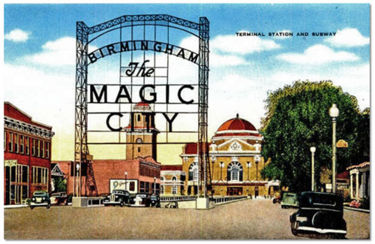The Magic City: Difference between revisions
No edit summary |
No edit summary |
||
| Line 2: | Line 2: | ||
'''The Magic City''' is the most recognized [[List of nicknames for Birmingham|nickname]] for [[Birmingham]]. It comes from the city's rapid growth, both in its earliest days, and again at the turn of the 20th century when the city's [[Downtown Birmingham|downtown]] area developed from a collection of small houses and businesses to one of the most impressive downtown areas in the country. | '''The Magic City''' is the most recognized [[List of nicknames for Birmingham|nickname]] for [[Birmingham]]. It comes from the city's rapid growth, both in its earliest days, and again at the turn of the 20th century when the city's [[Downtown Birmingham|downtown]] area developed from a collection of small houses and businesses to one of the most impressive downtown areas in the country. | ||
The first known use of the term was penned by [[James Powell]], president of the [[Elyton Land Company]] in his [[1873]] annual report to shareholders. Noting the status of the two-year-old city with 4,000 residents, hundreds of houses and stores, six churches and four hotels, he called Birmingham "this magic little city of ours." | The first known use of the term was penned by [[James Powell]], president of the [[Elyton Land Company]] in his [[1873]] annual report to shareholders. Noting the status of the two-year-old city with 4,000 residents, hundreds of houses and stores, six churches and four hotels, he called Birmingham "this magic little city of ours." "[[Birmingham, Alabama: The Magic City]]" was the title of an effusive 5-page feature article by Paul Cook in ''National Magazine'' in August [[1906]]. | ||
In [[1926]], a [[Magic City sign|large electric sign]] was erected outside [[Terminal Station|Birmingham Terminal Station]] saying, "Welcome to Birmingham, The Magic City." The phrase and the sign itself are referenced in [[Sun Ra]]'s seminal [[1966]] free-form jazz album ''[[The Magic City (album)|The Magic City]]''. The name is also used for numerous businesses and some events in the city, such as the [[Magic City Classic]], [[Magic City Art Connection]] and [[Magic City Flickr Group]]. | In [[1926]], a [[Magic City sign|large electric sign]] was erected outside [[Terminal Station|Birmingham Terminal Station]] saying, "Welcome to Birmingham, The Magic City." The phrase and the sign itself are referenced in [[Sun Ra]]'s seminal [[1966]] free-form jazz album ''[[The Magic City (album)|The Magic City]]''. The name is also used for numerous businesses and some events in the city, such as the [[Magic City Classic]], [[Magic City Art Connection]] and [[Magic City Flickr Group]]. | ||
Revision as of 18:53, 23 March 2014

The Magic City is the most recognized nickname for Birmingham. It comes from the city's rapid growth, both in its earliest days, and again at the turn of the 20th century when the city's downtown area developed from a collection of small houses and businesses to one of the most impressive downtown areas in the country.
The first known use of the term was penned by James Powell, president of the Elyton Land Company in his 1873 annual report to shareholders. Noting the status of the two-year-old city with 4,000 residents, hundreds of houses and stores, six churches and four hotels, he called Birmingham "this magic little city of ours." "Birmingham, Alabama: The Magic City" was the title of an effusive 5-page feature article by Paul Cook in National Magazine in August 1906.
In 1926, a large electric sign was erected outside Birmingham Terminal Station saying, "Welcome to Birmingham, The Magic City." The phrase and the sign itself are referenced in Sun Ra's seminal 1966 free-form jazz album The Magic City. The name is also used for numerous businesses and some events in the city, such as the Magic City Classic, Magic City Art Connection and Magic City Flickr Group.
Birmingham is not the only city that has been known by this nickname. Others include Miami, Florida; Billings, Montana; Minot, North Dakota; and Roanoke, Viriginia.
References
- "Magic City." (November 5, 2006). Wikipedia, The Free Encyclopedia. Accessed December 15, 2006 [1].